
How to Memorize Foreign Language Vocabulary FAST (Infographic)
The 4 Best Ways to Memorize Vocabulary in a Foreign Language
“Probably no aspect of learning a foreign language is more important than memory,” Paul Pimsleur.
Memorizing vocabulary in a foreign language is often one of the biggest challenges language learners face on their journey to fluency. The good news? Regardless of which foreign language you choose to learn, your brain still memorizes words in the same way. That’s where we come in.
Welcome to your Ultimate Guide on Foreign Language Vocabulary Memorization. This guide will teach you how to remember vocabulary words fast using the following techniques:
- Utilize Mediums You Love (Music, TV)
- Apply Mnemonic Devices
- Use Apps & Software
- Research Etymology & Cognates
So grab a pen and paper and let’s get to memorizing!
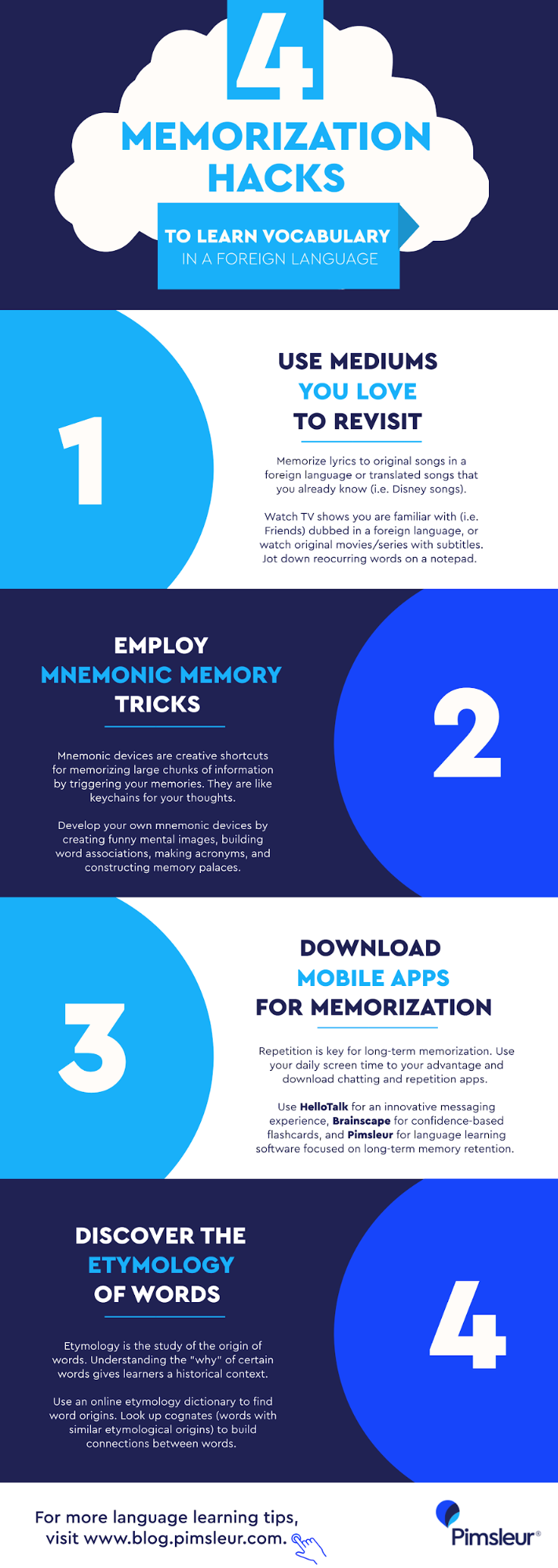
1. Memorize Words Through Mediums You Love
In Lydia Machova’s TED Talk on the secrets of learning a new language, she affirms that many polyglots start by learning the 500 most common words in a language.
The difference between polyglots and other language learners is that polyglots find ways to genuinely enjoy the memorization process.
How can you enjoy the memorization process? By using or combining the mediums that you already love and don’t mind revisiting daily. Our top two are music and TV.
Let’s take a look at each.
Memorize Lyrics to Songs You Already Know
Music is a great first step to memorization because you can start without understanding a single word and still be inspired by the melody.
Songs help with memorization because:
- Songs are often familiar.
- They incite emotion.
- They are repetitive.
A great place to start is by looking up a song you already know that is translated into a foreign language, for example, Disney songs.
To learn “A Whole New World” in German, just hop on over to YouTube. That way, you are already familiar with the beat and it will aid you greatly in translating the lyrics.
A Whole New World, Aladdin, German Version
Memorize Lyrics to Original Songs in a Foreign Language
If you prefer to learn songs from the country of the language you are trying to learn, it will definitely help you understand idioms, colloquialisms, and pop culture. They will not, however, be quite as easy to translate.
Some bloggers take it upon themselves to accurately translate popular songs for avid language-learners. For example, one of the most popular songs in Spanish, Despacito, had everyone asking “What is this song about?” leading to “lyrics explained” videos like the one below.
Key takeaway? Make a playlist of songs in the languages you want to learn, write down all of the lyrics with their translation, and listen to them whenever you are on your commute or washing the dishes.
Remember Vocabulary With TV Shows and Cartoons
Repetition. Watching TV shows and movies in foreign languages can help language-learners remember vocabulary because the characters often repeat the vocabulary over and over.
For example, if you are watching Narcos in Spanish, you will hear vocabulary words about drug trafficking, crime, and government repeated over and over. Not super light vocabulary, but it definitely gives you an (embellished) insight into Colombian history and politics over the last few decades.
Visual learners will get the most out of subtitles.
If you want lighter, more fundamental vocabulary, you can watch cartoons for kids in other languages.
For example, you can watch Peppa Pig or Dragon Ball Z in a bunch of different languages on YouTube and Netflix. The basic words (family, mom, dad, eat, sleep, etc.) will be repeated consecutively in context.
Streaming services like Netflix allow you to pick from a handful of different audios and subtitles. On Netflix, you can type in the language of your choice, say “Japanese”, and all the content they have in that particular language will appear, like so.
Before watching, make sure you have a notepad or the Notes app open on your phone.
While you’re watching, pause the show when you catch a new vocabulary word. Look it up and add it to the list. You will start to recognize the word and its usage in context over and over again.
2. Develop Mnemonic Memory Tricks to Remember Words
Memory is the process of storing information over time. What we remember has a lot to do with how well we digested the information in the first place, as well as how well we are able to retrieve it later.
Rote memorization is effective for about three or fewer ideas – anything more than that (like learning 500 vocabulary words, for example) and we’re likely not to recall the ideas without the proper cues.
This is where imagery and associations come in.
Mnemonic Devices are Like Keychains for Memories
We attach keychains to our keys so we won’t lose them – the same should apply with words.
Mnemonics are creative shortcuts for memorizing large chunks of information by triggering our memories. They can be acronyms, rhymes, or mental images that help us to remember words.
Here are a few examples of some awesome mnemonic devices to help with making those new words stick:
- Funny mental images: Associate words with outrageous or funny mental pictures.
- Word associations: Find words with similar meaning.
- Summaries: Use abbreviations and acronyms.
- Memory palaces: Making a journey in your mind through a place you know well.
Funny Mental Images Evoke Memory
A very effective method to memorize vocabulary is to create funny images that evoke memories for their ridiculous nature. Here’s an example.
In Portuguese, the word for “cane” is “bengala”, which is similar to the English word “Bengal”, as in “Bengal tiger”.
In order to remember this new vocabulary word, I created an image of a Bengal tiger in old age using a cane. I even made the cane pink to remember that the word “bengala” is feminine in Portuguese.
You can jot these images down in a notebook or just keep them in your head. They act as big, fuzzy keychains when retrieving vocabulary.
Make Mnemonic Word Associations
Take the word “strong” in Italian, “forte”. Remind you of any English words? You may think of a “military fort”. Then, you can make the association that soldiers tend to be extremely strong.
Creating these associations will bridge the gaps in your memory and help you develop your foreign vocabulary quickly.
Summarize Vocabulary Words into Acronyms
ROYGBV. Ring a bell?
This is how children are taught to memorize the colors of the rainbow.
The same applies for vocabulary memorization in a foreign language.
One of the most common vocabulary hacks in French is “Dr. & Mrs. Vandertrampp”, which is an acronym for the 17 verbs that take the verb “être” in the past tense (as opposed to “avoir”), which are:
|
D |
Devenir (to become) |
|
R |
Revenir (to come back) |
|
M |
Mourir (to die) |
|
R |
Retourner (to return) |
|
S |
Sortir (to go out) |
….and the list goes on. This time-tested memory hack is one of the best in the books and can be applied to any group of vocabulary words.
Create a Memory Palace to Retrieve Vocabulary
Better known as the method of “loci” (from Latin “locations), the memory palace was a memorization technique familiar to the ancient Greeks and Romans.
The technique is based on the use of an imaginary layout or place that the subject can walk through, where each location within the layout bears its own unique item.
The same example above can be applied to the memory palace (double points).
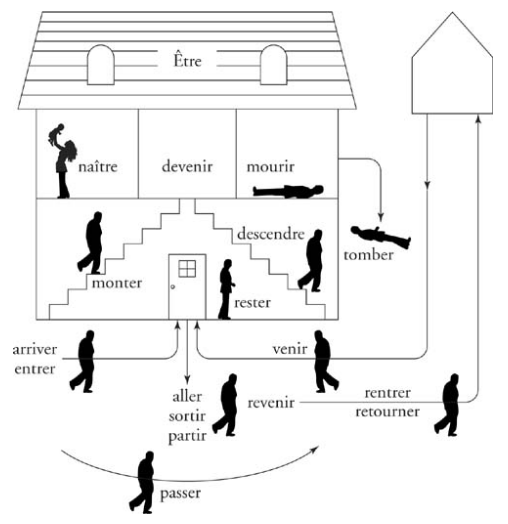
Bottom Line?
Use a combination of different mnemonic devices to see which ones work best for you. The ones that you enjoy are the ones that will stick with you. Never forget to attach your mental keychains to your new vocabulary words!
3. Use Apps to Repeat and Memorize Vocabulary
If you’re thinking “There’s probably an app for that.”, there is.
Repetition is key for language learning, yet most of the learning we do is stored in our short-term memory as opposed to our permanent (or long-term) memory.
Why is that?
We absorb, maybe even write down, but don’t repeat. Here are some different types of apps that will put your repetition in practice and help you retain vocabulary words quickly.
HelloTalk
Innovative messaging platform in which you can converse with other language-learners and test out your new vocabulary.
**Pro Tip: You can start a chat with one person and use that back-and-forth to start another chat, and so on. You will quickly start to become familiar with the basics of conversation.
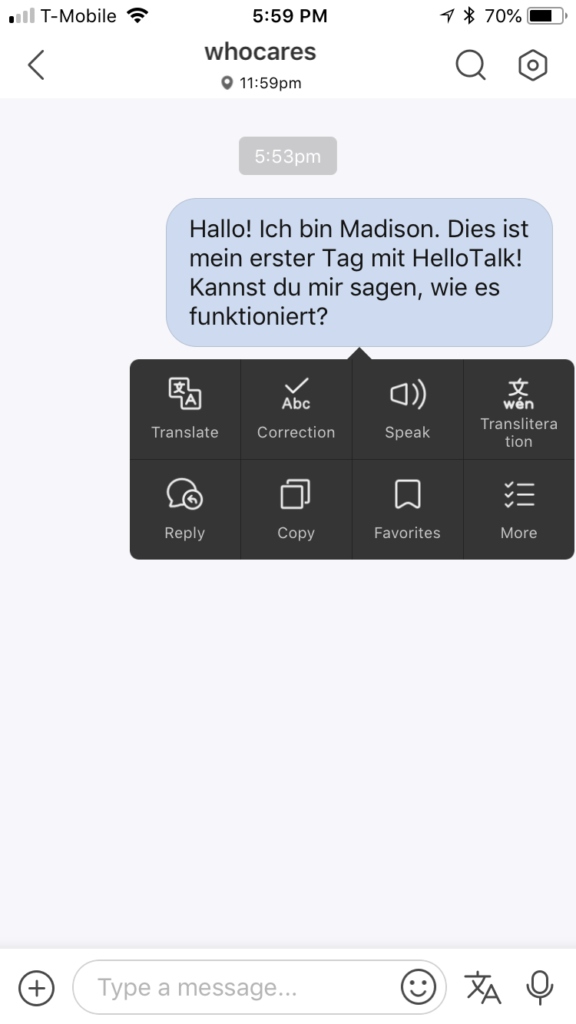
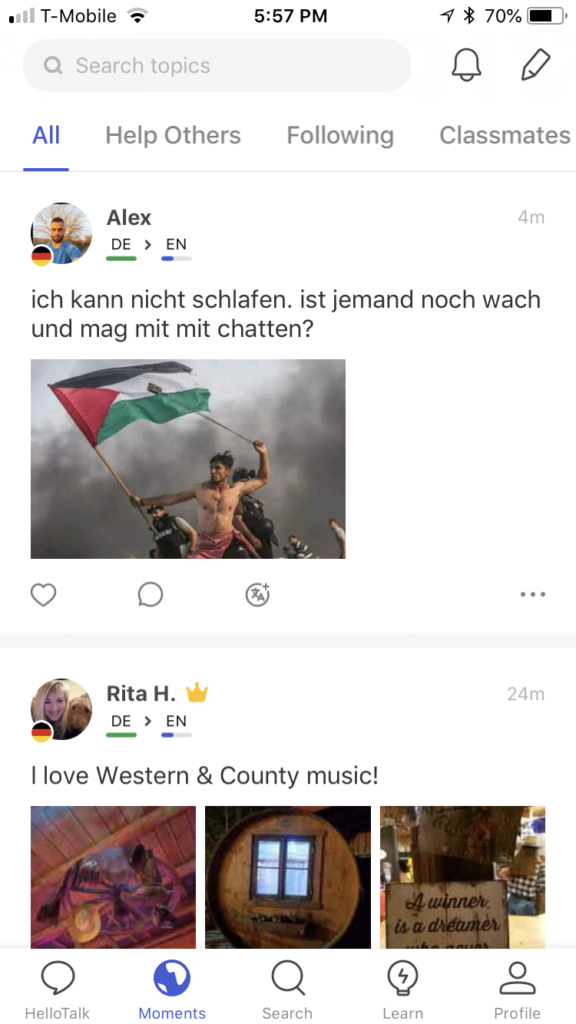
Brainscape
Confidence based repetition via digital flashcards online. You identify your confidence level and the cards adapt to focus on more challenging material. Practice your vocabulary recognition here!
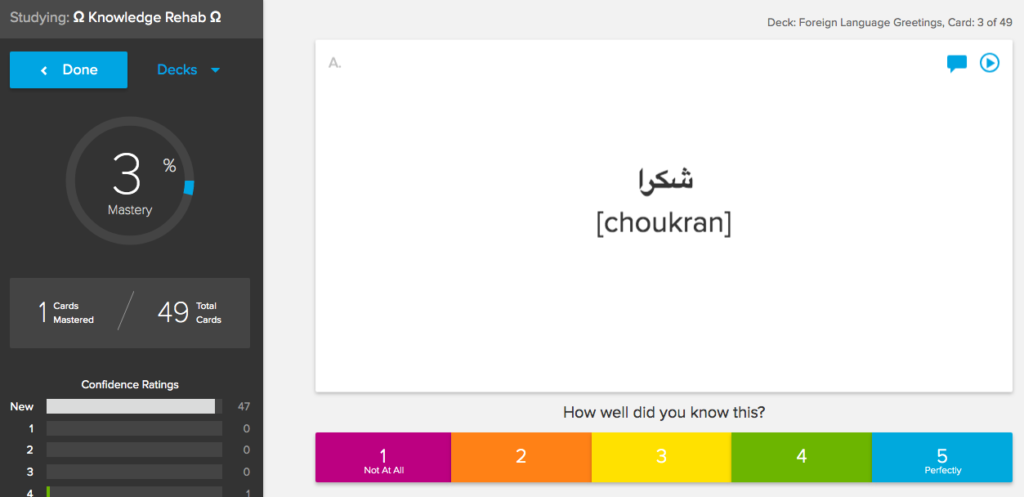
Pimsleur
A language learning app based on scientific principles discovered by the esteemed linguist, Dr. Paul Pimsleur. He found the optimal spacing interval for information that triggers long-term memory. New vocabulary is introduced in the context of conversations (mnemonic device) to accelerate learning.
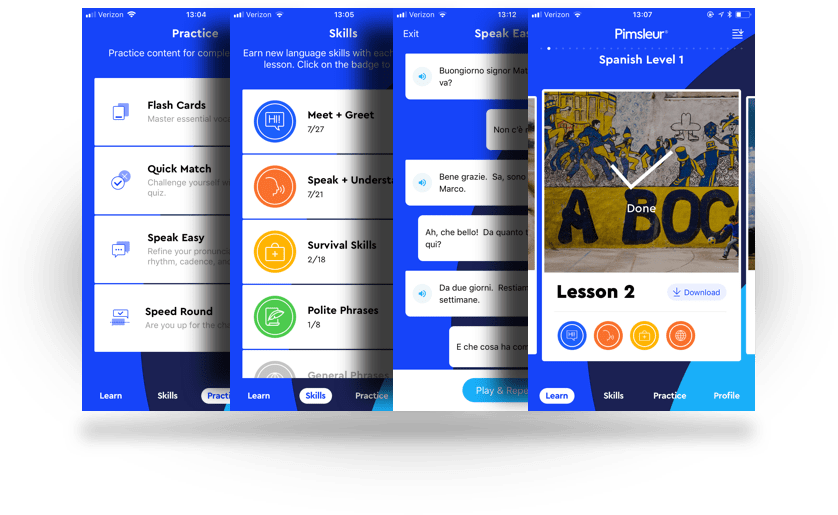
4. Learn How to Memorize Words by Their Origins
Understanding the why behind the words you’re learning aids greatly in memorization. This is where a good history lesson comes in.
Discover the Etymology of Your New Vocabulary Words
Etymology is the study of the origin of words and the way in which their meanings have changed throughout history. Understanding the origins of words allows you to attach multiple images to terms.
For example: Take the word ojalá in Spanish.
The word roughly translates to “hopefully”, but if we look deeper into the meaning of the word, it comes from the Arabic “Inshallah” or “law sha allah” meaning “If God should want” or “God willing.”
Even though Spain is a primarily Catholic nation, the nearly 800 years of Arabic settlement in the peninsula modified this Spanish word and many others. Read more about Spanish words with Arabic origins.
The next time your brain tries to search for the Spanish word for “hopefully”, you will remember this interesting fact and the word allah in conjunction with the word ojalá.
Find Cognates to Help Trigger Memory
Cognates are words that have similar etymological origins, like long-lost cousins. They are spelled similarly in different languages. Cognates will become your best friend as you delve into your memorization.
If you are learning Italian, the word for “oven” is forno, from the Latin fornus. You might also be pleased to know that other languages with Latin origins also have cognates of this word: French four, Portuguese forno, and English “furnace”.
In Spanish, many cognates of Latin words beginning with “f” like forno have dropped the “f” over time and modified to “h” → horno.
With one word, you have learned how to say “oven” in 5 different languages!
Check out these Spanish to English cognate examples to get a better idea of cognates (and false cognates!)
Bottom Line?
As you actively trace the origins of your words back through history, you are simultaneously tracing them through your mind.
How to Memorize Vocabulary in Another Language? Enjoy It!
The key takeaway here is to enjoy the madness of memorization as much as we do and celebrate the small victories in your language-learning journey.
Another great solution for remembering vocabulary words is to repeat them using our research-backed language learning software. Make repetition a habit by listening to Pimsleur audios on your commute, while you’re out on a jog, while you’re on a plane, etc.
Don’t forget – the first lesson is on us.


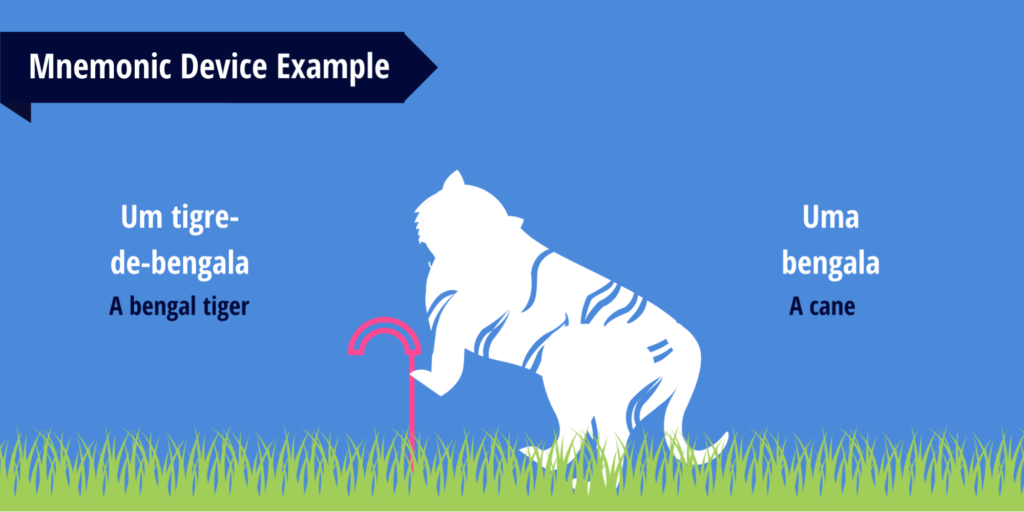
2 Comments for "How to Memorize Foreign Language Vocabulary FAST (Infographic)"
Great article, here are more tips to remember vocabulary: https://lingoperfecto.com/9-secret-tips-to-memorize-words-effectively/
Hi Madison, great post! I always just combine a vocabulary app with some kind of submersive experience to learn a new language. If you already know multiple languages then grammar etc tend to be quite easy to pick up just by submersing yourself in the language/culture. I normally use DuoCards.com and Duolingo.com to learn the vocab and then travel to the country or try to operate 100% (or as much as I can) in the language I’m learning. This improves your motivation to learn too. Once you have a baseline of 1000 or so words the process seems to really speed up. Whould love to get your thoughts on this! 😀